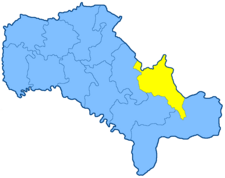Gaysin uezd
Гайсинскій уѣздъ | |
|---|---|
 Location in the Podolia Governorate | |
| Country | Russian Empire |
| Krai | Southwestern |
| Governorate | Podolia |
| Established | 1795 |
| Abolished | 1923 |
| Capital | Gaysin |
| Area | |
| • Total | 3,383.11 km2 (1,306.23 sq mi) |
| Population (1897) | |
| • Total | 248,142 |
| • Density | 73/km2 (190/sq mi) |
| • Urban | 3.78% |
| • Rural | 96.22% |
The Gaysin uezd[a] was a county (uezd) of the Podolian Governorate of the Russian Empire, with its administrative centre in Gaysin (modern-day Haisyn). The area of the Gaysin uezd covered the area of modern-day Haisyn Raion.
Administrative divisions[edit]
The subcounties (volosts) of the Bratslav uezd in 1912 were as follows:[1]
| Name | Name in Russian | Capital |
|---|---|---|
| Granov volost | Грановская волость | Granov |
| Kiblich volost | Кибличская волость | Kiblich |
| Kislyak volost | Кислякская волость | Kislyak |
| Krasnaya-Polka volost | Красно-Полкская волость | Krasnaya-Polka |
| Krasnoselka volost | Красноселкская волость | Krasnoselka |
| Kuna volost | Кунянская волость | Kuna |
| Ladyzhino volost | Ладыжинская волость | Ladyzhino |
| Nizhekrapivna volost | Ниже-Крапивнянская волость | Krapivna |
| Sobolevka volost | Соболевская волость | Sobolevka |
| Teplik volost | Тепликская волость | Teplik |
| Ternov volost | Терновская волость | Ternov |
| Khashchevata volost | Хащеватская волость | Khashchevata |
Demographics[edit]
At the time of the Russian Empire Census on 28 January [O.S. 15 January] 1897, the Gaysin uezd had a population of 248,142, including 123,305 men and 124,837 women. The majority of the population indicated Little Russian[b] to be their mother tongue, with a significant Jewish speaking minority.[4]
| Language | Native speakers | Percentage |
|---|---|---|
| Little Russian[b] | 214,218 | 86.33 |
| Jewish | 25,733 | 10.37 |
| Great Russian[b] | 4,662 | 1.88 |
| Polish | 3,043 | 1.23 |
| German | 184 | 0.07 |
| Tatar | 121 | 0.05 |
| Votyak | 36 | 0.01 |
| White Russian[b] | 24 | 0.01 |
| Gipsy | 23 | 0.01 |
| Czech | 19 | 0.01 |
| Romanian | 11 | 0.00 |
| French | 10 | 0.00 |
| Cheremis | 6 | 0.00 |
| Latvian | 6 | 0.00 |
| Bashkir | 2 | 0.00 |
| Chuvash | 1 | 0.00 |
| Other | 43 | 0.02 |
| Total | 248,142 | 100.00 |
Notes[edit]
- ^
- ^ a b c d Prior to 1918, the Imperial Russian government classified Russians as the Great Russians, Ukrainians as the Little Russians, and Belarusians as the White Russians. After the creation of the Ukrainian People's Republic in 1918, the Little Russians identified themselves as "Ukrainian".[2] Also, the Belarusian Democratic Republic which the White Russians identified themselves as "Belarusian".[3]
References[edit]
- ^ Волостныя, станичныя, сельския, гминныя правления и управления, а также полицейские станы всей России с обозначением места их нахождения [Volostny, stanichnaya, rural, communes of government and administration, as well as police camps throughout Russia with the designation of their location]. Kiev: Izd-vo T-va L. M. Fish. 1913. p. 162. Archived from the original on 2022-12-11.
- ^ Hamm, Michael F. (2014). Kiev: A Portrait, 1800–1917. Princeton University Press. p. 83. ISBN 978-1-4008-5151-5.
- ^ Fortson IV, Benjamin W. (2011). Indo-European Language and Culture: An Introduction. John Wiley & Sons. p. 429. ISBN 978-1-4443-5968-8.
- ^ "Демоскоп Weekly - Приложение. Справочник статистических показателей". www.demoscope.ru. Retrieved 2019-12-19.
